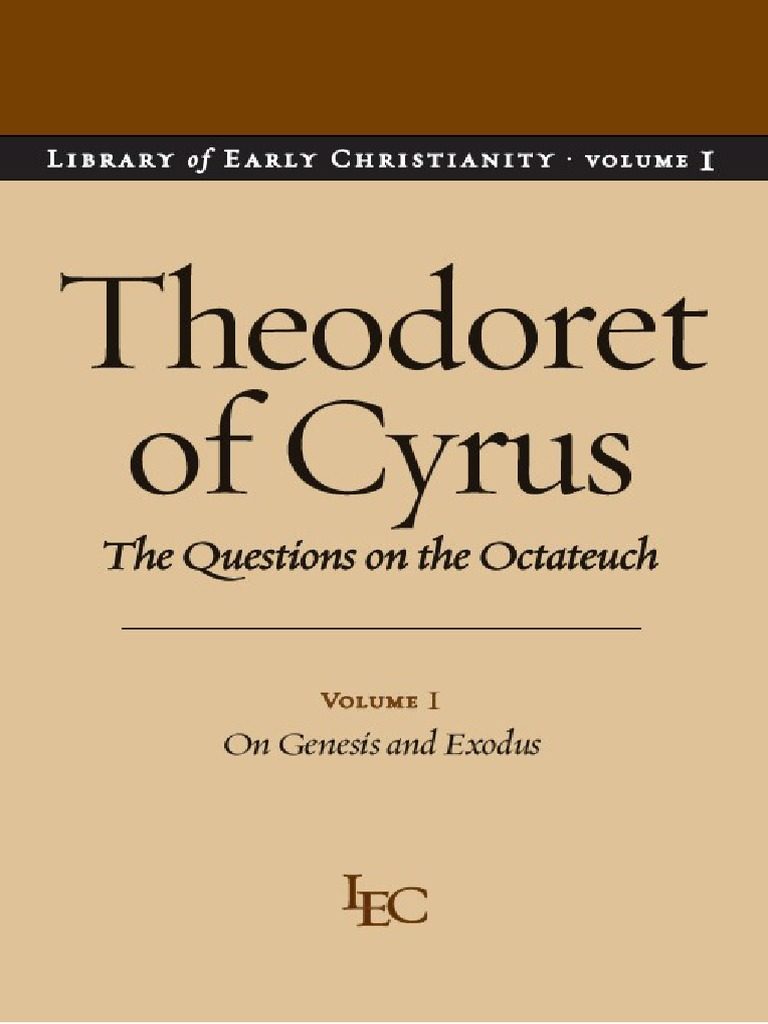Theodoret of Cyrus (393-458) was from an illustrious family in Antioch. His teacher was Theodore of Mopsuestia and one of his classmates was the controversial Nestorius. He would study rhetoric with Saint John Chrysostom. As a young person he followed monastic life but this kind of life was interrupted when he was elevated as a Bishop of Cyrus, near Antioch. At a certain point he came close to the ideas of Nestorius, falling into his heresy. But somehow he was able to redeem himself. Among his writings we can remember his Ecclesiastical History. There are also many writings in commenting the Bible: “In hermeneutics Theodoret followed the principles of the Antiochene school, but avoided the bias of Theodore of Mopsuestia. In his Christology also he followed the terminology of Diodorus and Theodore, and saw in the teaching of Cyril a revival of Apollinarianism. He would never acknowledge that the teaching of Nestorius presupposed the acceptance of two persons in Christ or, as Cyril believed, necessarily led to it” (Baur, C. “Theodoret,” The Catholic Encyclopedia, New York: Robert Appleton Company).
In his Ecclesiastical History, talking about the Council of Nicaea and some of his protagonists, he wrote: “At this period many individuals were richly endowed with apostolic gifts; and many, like the holy apostle, bore in their bodies the marks of the Lord Jesus Christ. James, bishop of Antioch, a city of Mygdonia, which is called Nisibis by the Syrians and Assyrians, raised the dead and restored them to life, and performed many other wonders which it would be superfluous to mention again in detail in this history, as I have already given an account of them in my work, entitled Philotheus. Paul, bishop of Neo-Caesarea, a fortress situated on the banks of the Euphrates, had suffered from the frantic rage of Licinius. He had been deprived of the use of both hands by the application of a red-hot iron, by which the nerves which give motion to the muscles had been contracted and rendered dead. Some had had the right eye dug out, others had lost the right arm. Among these was Paphnutius of Egypt. In short, the Council looked like an assembled army of martyrs. Yet this holy and celebrated gathering was not entirely free from the element of opposition; for there were some, though so few as easily to be reckoned, of fair surface, like dangerous shallows, who really, though not openly, supported the blasphemy of Arius.”
In a letter to Dioscorus, Bishop of Alexandria, he said: “It is not the fame of my sermons to which I am calling attention; it is their orthodoxy alone. Even the great teacher of the world who is wont to style himself last of saints and first of sinners, that he might stop the mouths of liars was compelled to set forth a list of his own labors; and in showing that this account of his sufferings was of necessity, not of free will, he added I have become a fool in glorying; you have compelled me. I own myself wretched — aye thrice wretched. I am guilty of many errors. Through faith alone I look for finding some mercy in the day of the Lord’s appearing. I wish and I pray that I may follow the footprints of the holy Fathers, and I earnestly desire to keep undefiled the evangelic teaching which was in sum delivered to us by the holy Fathers assembled in council at the Bithynian Nicæa. I believe that there is one God the Father and one Holy Ghost proceeding from the Father: so also that there is one Lord Jesus Christ, only begotten Son of God, begotten of the Father before all ages, brightness of His glory and express image of the Father’s person, on account of man’s salvation, incarnate and made man and born of Mary the Virgin in the flesh. For so are we taught by the wise Paul whose are the Fathers and of whom as concerning the flesh Christ came, who is over all, God blessed forever. Amen, and again Concerning His Son Jesus Christ our Lord which was made of the seed of David according to the flesh and declared to be the Son of God with power according to the spirit of holiness. On this account we also call the holy Virgin Theotokos, and deem those who object to this appellation to be alienated from true religion. In the same manner we call those men corrupt and exclude them from the assembly of the Christians, who divide our one Lord Jesus Christ into two persons or two sons or two Lords, for we have heard the very divine Paul saying One Lord, one faith, one baptism and again One Lord Jesus Christ by Whom are all things and again Jesus Christ the same yesterday and today and for ever and in another place — He that descended is the same also that ascended up far above all heavens. And countless other passages of this kind may be found in the Apostle’s writings, proclaiming the one Lord.”
The humility of Theodoret is a good lesson also for us.


 Follow
Follow


